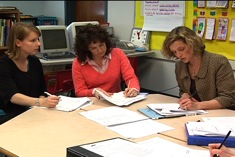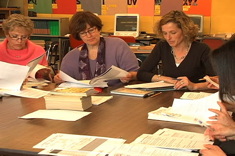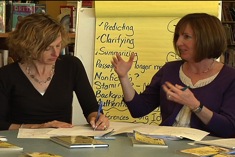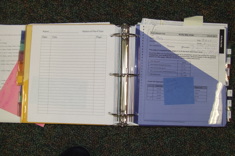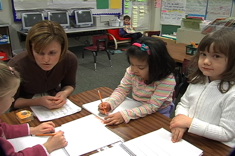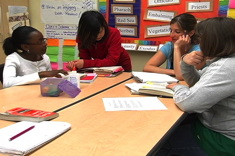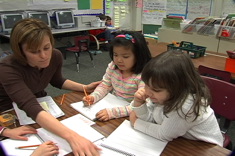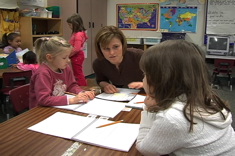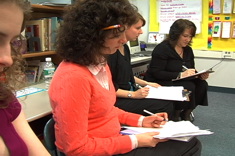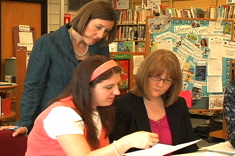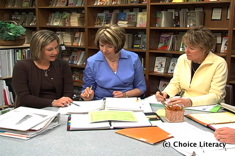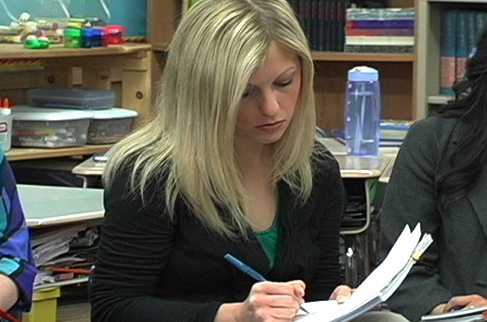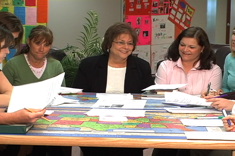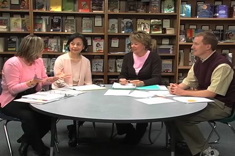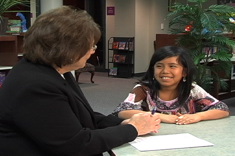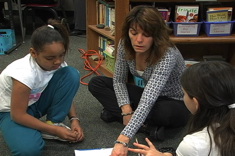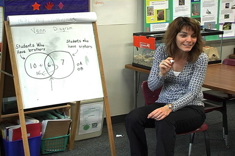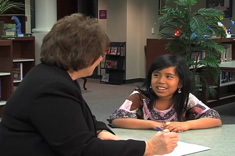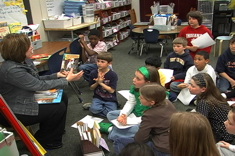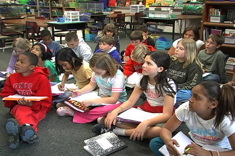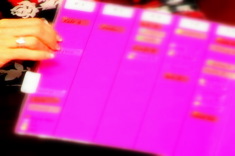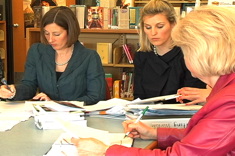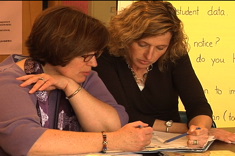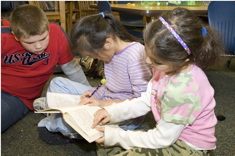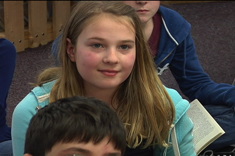Assessment Tools
Making sense of the enormous amount of student data in any classroom or school is probably the biggest challenge we face individually and in our school communities. Here you'll find everything from one-page templates created by teachers for use in their classrooms to videos of staff teams poring over large data sets. We don't have all the answers, but we do provide tools to help you ask better questions as you evaluate students and talk about assessments with your colleagues.
Latest Content
Looking for Evidence: Seven Questions
With all the things teachers could focus on in their observations of students, what are the key behaviors to look for in assessing literacy growth and development? Ruth Shagoury notes the questions she uses to focus her observations and assessment of student comprehension of texts.
From “Data Drowning” to “Data Wise”: What Are We Doing Now?
Clare Landrigan and Tammy Mulligan provide an activity for staff meetings designed to help schools sort through the purpose and value of current assessments.
Moving from Data to Practice
Clare Landrigan and Tammy Mulligan give advice for how to create databases and graphic analyses of assessment information that teachers can readily access and use.
Fostering More Curricular Collaboration in Teams: The Meeting Notes Form (TEMPLATE)
Katie Doherty faces daunting challenges as a grade-level team leader in her middle school. A simple notetaking form works wonders in elevating the conversations and collaboration.
An Assessment Notebook That Works for Me
After lots of trial and error, Franki Sibberson finally has a format for her assessment notebook that works well.
Assessing Spelling in Writing Workshops Part 1: Thinking Through the Assessment
Katie DiCesare takes on the challenge of developing a one-page assessment tool to analyze the spelling needs and abilities of each of her 1st graders. This is the first in a series, as Katie takes us through the use of the tool in her workshop.
Middle School Readers at Mid-Year (SURVEY TEMPLATE)
Katie Doherty finds surveys of student reading habits and preferences are really useful in the winter, after she knows her students and they’ve settled into a routine.
Assessing Spelling in Writing Workshop Part 2: Noticing Patterns in Individuals, Small Groups and the Whole Group
Katie DiCesare took on the challenge of developing a one-page assessment tool to analyze the spelling needs and abilities of each of her 1st graders. In the second of her three-part series, Katie shows how she translates the findings from individual students into instructional plans.
Assessing Spelling in Writing Workshop Part 3: Embedding Instruction
In the last installment of this three-part series, Katie DiCesare shows how she translates the findings from individual students into instructional plans when she uses a spelling assessment in her 1st grade classroom.
Notetaking Strategies Part I: “In the Midst” and “After the Fact” Notes
There is a difference between “in the midst” and “after the fact” notes, and different methods might work better in different observation contexts once you know your options.
Notetaking Series Part III: “Raw” and “Cooked” Notes
In "Raw and Cooked Notes," the value of uncensored notes is presented, as well as a simple strategy for beginning to code and analyze the observations you are jotting down.
Notetaking Series, Part IV: What Counts and Writing the Unwritable
Here are some strategies for getting out of notetaking ruts.
Notetaking Series Part V: Getting Out of Notetaking Ruts
It's a quick journey from notetaking routines to notetaking ruts. This installment of the notetaking series focuses on ways to get out of the ruts that emerge naturally whenever any notetaking routine is established.
Establishing a Routine for Notetaking
We close out the notetaking series with advice on setting notetaking goals.
Grade Level Team Meeting: Test Preparation
In this video of a 3rd grade team meeting, literacy coaches Janet Scott and Gail Boushey help third-grade teachers think through what is going well with test preparation, and what might be adapted before the tests begin in a few weeks.
Student Reading Interview: Assessing Ana Part 2
This is the second video in a two-part series. Principal Karen Szymusiak interviewed Ana, a second grader, to learn more about her strengths and needs as a reader. In this week’s installment, Karen will share her findings with Ana’s teacher.
Conferring Close-Up: Test-Taking Strategies Part II
Andrea Smith confers with two 4th graders in her classroom as part of test preparation.
Test-Taking Strategies Part III: Whole Class Debrief
Andrea Smith’s 4th graders debrief together after a test preparation workshop.
Student Reading Interview: Assessing Ana
Principal Karen Szymusiak interviews Ana, a second grader, to learn more about her strengths and needs as a reader.
Helping Students Set Nonfiction Reading Goals
Franki Sibberson finds nonfiction reading goals elevate the value of nonfiction in her grades 3-4 classroom.
Talking About Tests
Franki Sibberson prepares her grades 3-4 students for state examinations by helping them observe attributes and patterns in test questions.
Test-Taking Skills: Reading Strategies for Word Problems Part I
Question It – Know It – Show It are the keys to test preparation in Andrea Smith's 4th grade classroom.
Data Cards: Assessment Profiles at a Glance
“Data cards” are ingeniously designed to allow an entire grade-level team to look at the reading levels of all students in the grade. In this four-minute video, “The Sisters” (Gail Boushey and Joan Moser) explain how they work.
Collaborative Team Meeting: Assessing and Planning Together
Gail Boushey leads a collaborative planning meeting between 4th grade teachers, literacy coaches, and the principal early in the year.
Assessment and Curriculum Mapping
In this video from a new teacher study group for grades 3-5 teachers, Jennifer Allen demonstrates how teachers can use assessment data to develop instructional plans for individual students and create curriculum maps for an entire class of students.
Professional Development Needs Assessment Inventory
Teachers help define a literacy coach's role through a needs assessment survey.
Conferring with Yourself: A Tool for Anticipating Response (TEMPLATE)
Take time for this quick write and Brenda Power will have you conferring with yourself, considering new viewpoints and thoughtfully preparing for your "yeah but" colleagues.
Starting Points: Easy Beginnings for Writing Better Narrative Assessments and Report Card Comments
If you struggle as a writer at report card time, these tips might give you ideas for streamlining your work.
Enlisting Students as Observers
Students are keen observers – put those talents to work in your classroom.
Adjectives to Anecdotes: Writing Better Report Card Comments
Brenda Power helps report card comment writers pack a punch in a few lines with positivity, honesty and some time-saving tips.
Browse Content By
Type
Category
- Assessment Tools
- Big Fresh Archives
- Booklists
- Choice Numeracy
- Classroom Design
- Common Core
- Community Building
- Conferring
- Content Literacy
- Digital Literacy
- English Language Learners
- Equity
- Family Relations
- Free Samples
- Guiding Groups
- Leadership
- Literacy Coaches
- Mentor Texts
- Minilessons
- New Teacher Mentors
- Podcasts
- Poetry
- Quote Collections
- Reading Strategies
- Self Care
- Struggling and Striving Learners
- Talking and Listening
- Teacher Study Groups
- Teaching Reading
- Teaching Writing
- Word Study and Vocabulary
Author
- Melissa Quimby
- Nawal Qarooni
- Gwen Blumberg
- Julie Cox
- The Lead Learners
- Hannah Tills
- Josie Stewart
- Ruth Metcalfe
- Mallory Messenger
- Becca Burk
- Jodie Bailey
- Vivian Chen
- Mary Brower
- Tiffany Abbott Fuller
- Stephanie Affinito
- Ruth Ayres
- Leigh Anne Eck
- Heather Fisher
- Shari Frost
- Julie Johnson
- Suzy Kaback
- Gigi McAllister
- Shirl McPhillips
- Melanie Meehan
- Cathy Mere
- Debbie Miller
- Tara Barnett and Kate Mills
- Tammy Mulligan
- Dana Murphy
- Bitsy Parks
- David Pittman
- Brenda Power
- Heather Rader
- Matt Renwick
- Mandy Robek
- Christy Rush-Levine
- Gretchen Schroeder
- Jen Schwanke
- Brian Sepe
- Katherine Sokolowski
- Stella Villalba
- Jennifer Vincent
Grade Level
Choice Literacy Membership
Articles
Get full access to all Choice Literacy article content
Videos
Get full access to all Choice Literacy video content
Courses
Access Choice Literacy course curriculum and training


